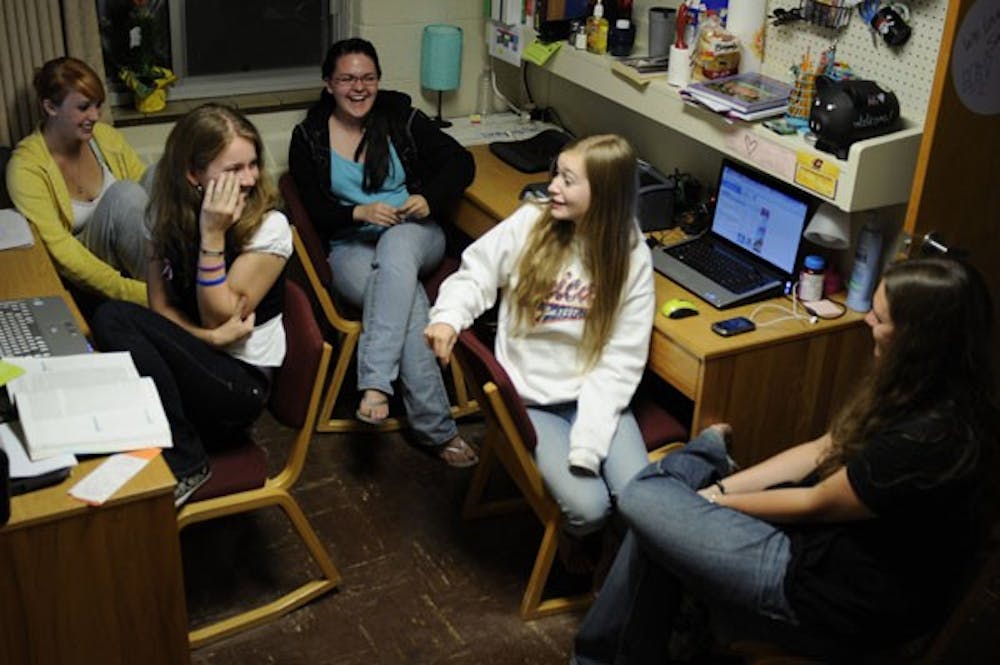Housing still a problem, some LGBTQ students say

After a resolution was proposed by the Student Government Association to create LGBTQ-specific housing, its denial raised several questions about housing for LGBTQ students at Central Michigan University.
Gender-neutral housing, an option that allows transgender and gender nonconforming students to live together regardless of their sex, is intended to provide students a safe living environment.
When the present SGA administration brought up the resolution, it was dismissed as discriminatory and many concerns about the ramifications were high emotions.
Kai Niezgoda, a Royal Oak junior who identifies as genderqueer and uses gender-neutral pronouns including they, them and theirs, lived in gender-inclusive dorms in Larzelere Hall for two years.
"If I hadn't known someone else gender nonconforming when I got to Central, I wouldn't have had a roommate," Niezgoda said. "I think that would have impacted my experience negatively."
Genderqueer is a term that describes individual who do not feel that their gender identity fits with the cultural norms of their biological sex.
In some circumstances, roommates who are insensitive have turned deadly.
Rutgers University freshmanTyler Clementi killed himself in 2010 after learning his roommate filmed him having a sexual encounter with a man. His roommate was convicted of 15 criminal charges and served 20 days in jail.
The Centers for Disease Control reports that suicide is the third leading cause of death for people ages 15-25 and members for the LGBTQ community are more at risk than heterosexuals.
In the spring 2014 semester, a resolution endorsed by Spectrum and Transcend, student organizations for students who are in the LGBTQ community, was passed in the SGA. The resolution would ask students on the housing questionnaire if they would be comfortable living with someone who identifies as LGBTQ.
Founder and executive director Shane Windmeyer of Campus Pride, a national nonprofit that provides resources to LGBTQ students, said he heard about the resolution in SGA because he knows a student that attends CMU.
Students who proposed it were misguided, Windmeyer said, but their concerns about safety are legitimate.
"The LGBTQ students who proposed this had a very good reason for doing so," Windmeyer said. "Everyone deserves to be in a housing situation where they feel safe."
He said Campus Pride suggests universities have a "theme" or "living-learning hall" for LGBTQ and ally students.
Theme halls are places where students who identify in the community can live and be among like-minded people. A living-learning hall is where students both live and are educated throughout the year about issues related to the LGBTQ community.
Universities that have theme halls or houses specifically for the LGBTQ community and allies include the University of California-Berkeley, University of California-Irvine, Wesleyan University and University of Southern Maine. Windmeyer said universities need to be proactive when it comes to housing for LGBTQ students.
Niezgoda said gender-neutral housing is done on an individual basis outside the housing system. They have personally worked with the university to create more awareness for gender-neutral housing.
"When I first signed up for it, I was unable to locate any info on the CMU website, and eventually found it by Googling a very specific pair of search terms," Niezgoda said. "Information on it is now more readily available on the housing website, and from my understanding there is now a blurb about it on the regular housing sign-up form."
Warren sophomore Precious-Angel Jennings was the SGA representative for Spectrum last year and worked on the resolution.
She said Spectrum came up with the idea for the question after other members talk about some of their friend's experiences of being harassed in the dorm. Jennings said she feels people misunderstood the intention of the resolution.
"The proposal was not to out people based on their sexual orientation, but to be more comfortable and be able to live in a comfortable situation," Jennings said. "I think people should have thought about the question more in depth."
Niezgoda said they supported the resolution because the gender-inclusive housing system requires students to contact the office directly. This can be problematic for students who are not open about their gender expression.
Niezgoda said that they have a friend who identifies as genderqueer, but was not out to their parents, and therefore did not take advantage of the gender-inclusive housing.
"They have had to switch rooms to get away from homophobic and transphobic roommates who were extremely hostile toward them, which is completely unacceptable," Niezgoda said. "Students who have never experienced anti-LGBTQ violence, harassment and discrimination cannot possibly have a nuanced enough understanding of the issue to determine whether or not such a policy is relevant or important."
CMU is one of 153 public universities that provides gender-inclusive housing for transgender and gender nonconforming students.



